This emotional quirk has the dramatic
VerifiedAdded on 2022/08/22
|8
|1934
|11
AI Summary
Contribute Materials
Your contribution can guide someone’s learning journey. Share your
documents today.
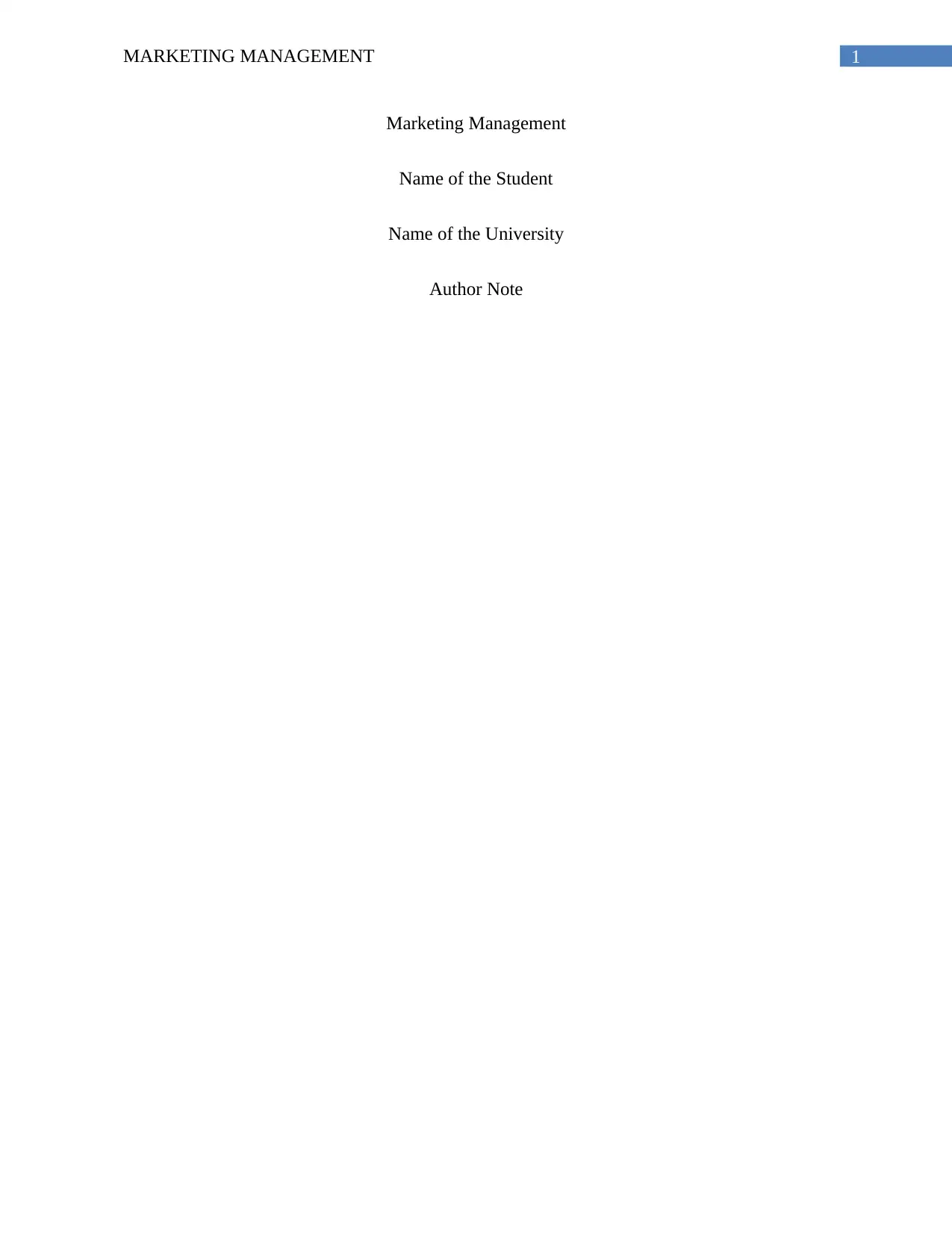
1MARKETING MANAGEMENT
Marketing Management
Name of the Student
Name of the University
Author Note
Marketing Management
Name of the Student
Name of the University
Author Note
Secure Best Marks with AI Grader
Need help grading? Try our AI Grader for instant feedback on your assignments.
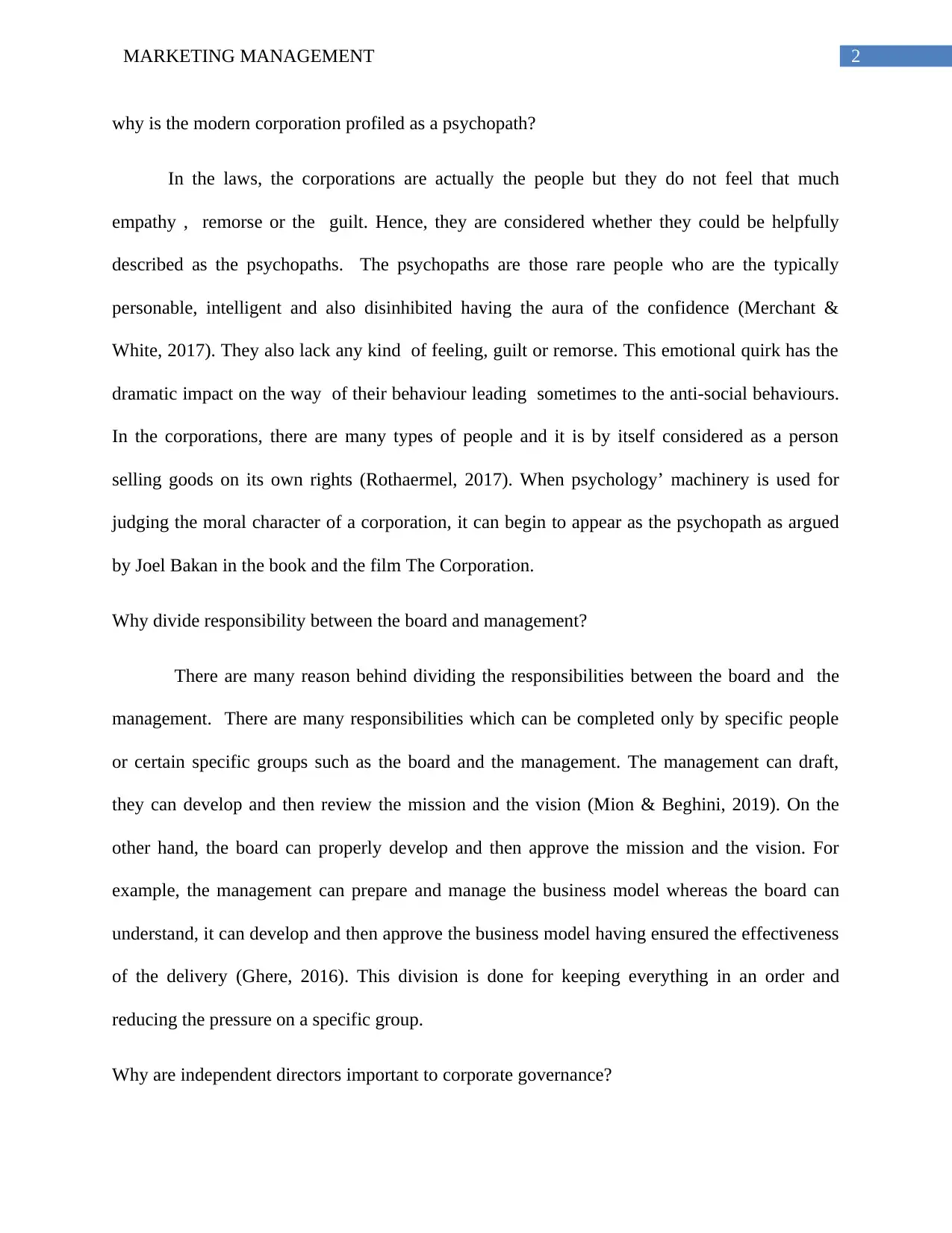
2MARKETING MANAGEMENT
why is the modern corporation profiled as a psychopath?
In the laws, the corporations are actually the people but they do not feel that much
empathy , remorse or the guilt. Hence, they are considered whether they could be helpfully
described as the psychopaths. The psychopaths are those rare people who are the typically
personable, intelligent and also disinhibited having the aura of the confidence (Merchant &
White, 2017). They also lack any kind of feeling, guilt or remorse. This emotional quirk has the
dramatic impact on the way of their behaviour leading sometimes to the anti-social behaviours.
In the corporations, there are many types of people and it is by itself considered as a person
selling goods on its own rights (Rothaermel, 2017). When psychology’ machinery is used for
judging the moral character of a corporation, it can begin to appear as the psychopath as argued
by Joel Bakan in the book and the film The Corporation.
Why divide responsibility between the board and management?
There are many reason behind dividing the responsibilities between the board and the
management. There are many responsibilities which can be completed only by specific people
or certain specific groups such as the board and the management. The management can draft,
they can develop and then review the mission and the vision (Mion & Beghini, 2019). On the
other hand, the board can properly develop and then approve the mission and the vision. For
example, the management can prepare and manage the business model whereas the board can
understand, it can develop and then approve the business model having ensured the effectiveness
of the delivery (Ghere, 2016). This division is done for keeping everything in an order and
reducing the pressure on a specific group.
Why are independent directors important to corporate governance?
why is the modern corporation profiled as a psychopath?
In the laws, the corporations are actually the people but they do not feel that much
empathy , remorse or the guilt. Hence, they are considered whether they could be helpfully
described as the psychopaths. The psychopaths are those rare people who are the typically
personable, intelligent and also disinhibited having the aura of the confidence (Merchant &
White, 2017). They also lack any kind of feeling, guilt or remorse. This emotional quirk has the
dramatic impact on the way of their behaviour leading sometimes to the anti-social behaviours.
In the corporations, there are many types of people and it is by itself considered as a person
selling goods on its own rights (Rothaermel, 2017). When psychology’ machinery is used for
judging the moral character of a corporation, it can begin to appear as the psychopath as argued
by Joel Bakan in the book and the film The Corporation.
Why divide responsibility between the board and management?
There are many reason behind dividing the responsibilities between the board and the
management. There are many responsibilities which can be completed only by specific people
or certain specific groups such as the board and the management. The management can draft,
they can develop and then review the mission and the vision (Mion & Beghini, 2019). On the
other hand, the board can properly develop and then approve the mission and the vision. For
example, the management can prepare and manage the business model whereas the board can
understand, it can develop and then approve the business model having ensured the effectiveness
of the delivery (Ghere, 2016). This division is done for keeping everything in an order and
reducing the pressure on a specific group.
Why are independent directors important to corporate governance?
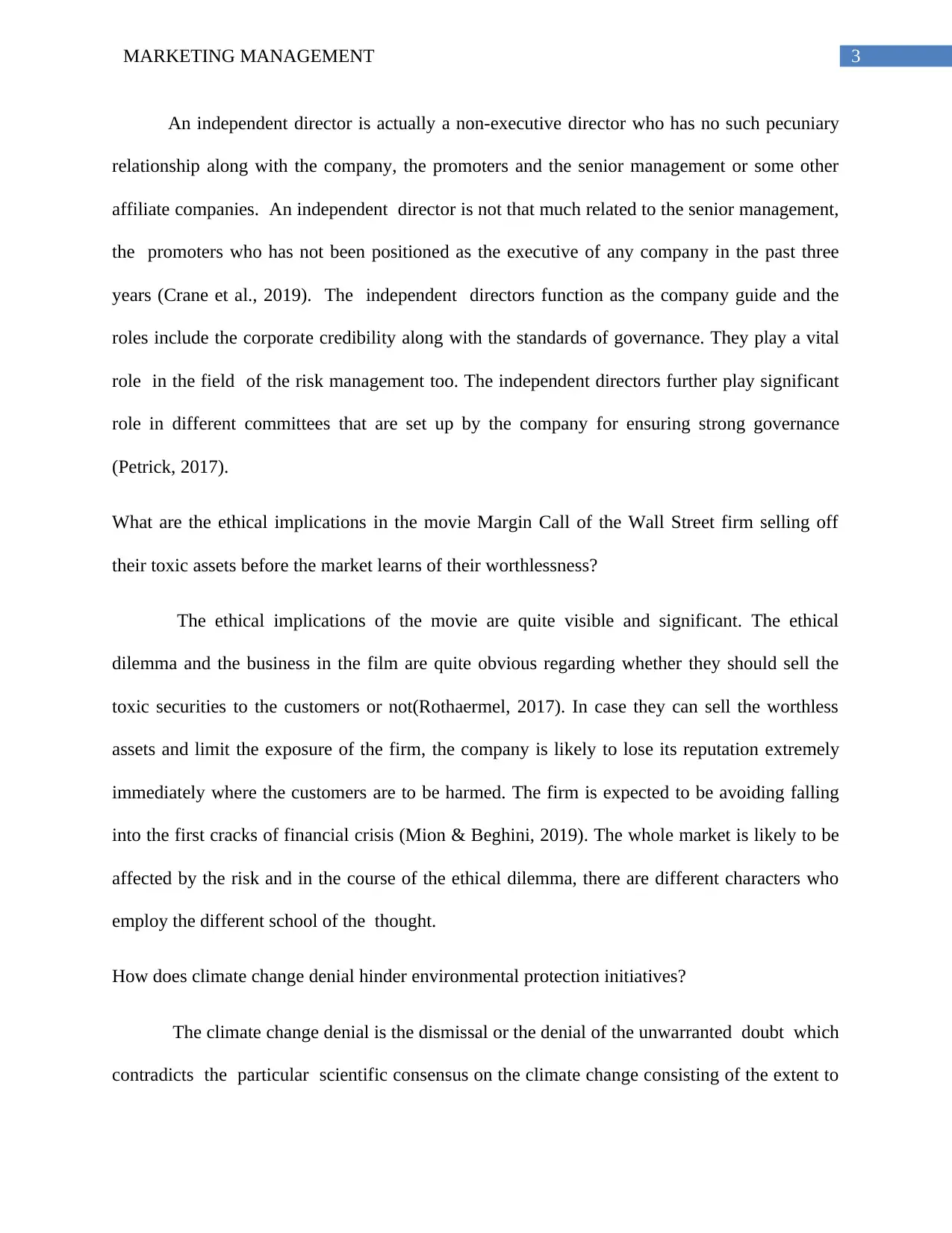
3MARKETING MANAGEMENT
An independent director is actually a non-executive director who has no such pecuniary
relationship along with the company, the promoters and the senior management or some other
affiliate companies. An independent director is not that much related to the senior management,
the promoters who has not been positioned as the executive of any company in the past three
years (Crane et al., 2019). The independent directors function as the company guide and the
roles include the corporate credibility along with the standards of governance. They play a vital
role in the field of the risk management too. The independent directors further play significant
role in different committees that are set up by the company for ensuring strong governance
(Petrick, 2017).
What are the ethical implications in the movie Margin Call of the Wall Street firm selling off
their toxic assets before the market learns of their worthlessness?
The ethical implications of the movie are quite visible and significant. The ethical
dilemma and the business in the film are quite obvious regarding whether they should sell the
toxic securities to the customers or not(Rothaermel, 2017). In case they can sell the worthless
assets and limit the exposure of the firm, the company is likely to lose its reputation extremely
immediately where the customers are to be harmed. The firm is expected to be avoiding falling
into the first cracks of financial crisis (Mion & Beghini, 2019). The whole market is likely to be
affected by the risk and in the course of the ethical dilemma, there are different characters who
employ the different school of the thought.
How does climate change denial hinder environmental protection initiatives?
The climate change denial is the dismissal or the denial of the unwarranted doubt which
contradicts the particular scientific consensus on the climate change consisting of the extent to
An independent director is actually a non-executive director who has no such pecuniary
relationship along with the company, the promoters and the senior management or some other
affiliate companies. An independent director is not that much related to the senior management,
the promoters who has not been positioned as the executive of any company in the past three
years (Crane et al., 2019). The independent directors function as the company guide and the
roles include the corporate credibility along with the standards of governance. They play a vital
role in the field of the risk management too. The independent directors further play significant
role in different committees that are set up by the company for ensuring strong governance
(Petrick, 2017).
What are the ethical implications in the movie Margin Call of the Wall Street firm selling off
their toxic assets before the market learns of their worthlessness?
The ethical implications of the movie are quite visible and significant. The ethical
dilemma and the business in the film are quite obvious regarding whether they should sell the
toxic securities to the customers or not(Rothaermel, 2017). In case they can sell the worthless
assets and limit the exposure of the firm, the company is likely to lose its reputation extremely
immediately where the customers are to be harmed. The firm is expected to be avoiding falling
into the first cracks of financial crisis (Mion & Beghini, 2019). The whole market is likely to be
affected by the risk and in the course of the ethical dilemma, there are different characters who
employ the different school of the thought.
How does climate change denial hinder environmental protection initiatives?
The climate change denial is the dismissal or the denial of the unwarranted doubt which
contradicts the particular scientific consensus on the climate change consisting of the extent to
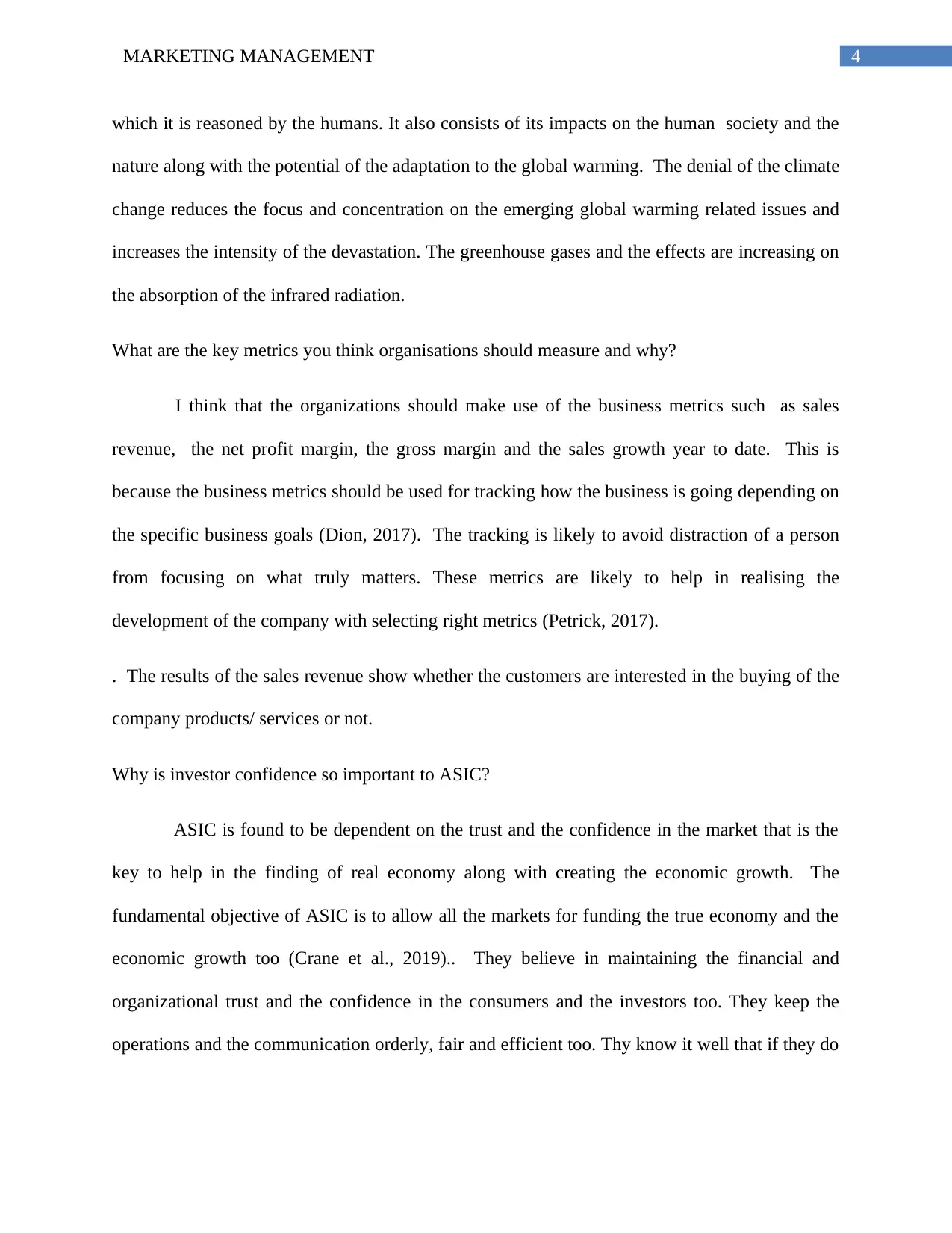
4MARKETING MANAGEMENT
which it is reasoned by the humans. It also consists of its impacts on the human society and the
nature along with the potential of the adaptation to the global warming. The denial of the climate
change reduces the focus and concentration on the emerging global warming related issues and
increases the intensity of the devastation. The greenhouse gases and the effects are increasing on
the absorption of the infrared radiation.
What are the key metrics you think organisations should measure and why?
I think that the organizations should make use of the business metrics such as sales
revenue, the net profit margin, the gross margin and the sales growth year to date. This is
because the business metrics should be used for tracking how the business is going depending on
the specific business goals (Dion, 2017). The tracking is likely to avoid distraction of a person
from focusing on what truly matters. These metrics are likely to help in realising the
development of the company with selecting right metrics (Petrick, 2017).
. The results of the sales revenue show whether the customers are interested in the buying of the
company products/ services or not.
Why is investor confidence so important to ASIC?
ASIC is found to be dependent on the trust and the confidence in the market that is the
key to help in the finding of real economy along with creating the economic growth. The
fundamental objective of ASIC is to allow all the markets for funding the true economy and the
economic growth too (Crane et al., 2019).. They believe in maintaining the financial and
organizational trust and the confidence in the consumers and the investors too. They keep the
operations and the communication orderly, fair and efficient too. Thy know it well that if they do
which it is reasoned by the humans. It also consists of its impacts on the human society and the
nature along with the potential of the adaptation to the global warming. The denial of the climate
change reduces the focus and concentration on the emerging global warming related issues and
increases the intensity of the devastation. The greenhouse gases and the effects are increasing on
the absorption of the infrared radiation.
What are the key metrics you think organisations should measure and why?
I think that the organizations should make use of the business metrics such as sales
revenue, the net profit margin, the gross margin and the sales growth year to date. This is
because the business metrics should be used for tracking how the business is going depending on
the specific business goals (Dion, 2017). The tracking is likely to avoid distraction of a person
from focusing on what truly matters. These metrics are likely to help in realising the
development of the company with selecting right metrics (Petrick, 2017).
. The results of the sales revenue show whether the customers are interested in the buying of the
company products/ services or not.
Why is investor confidence so important to ASIC?
ASIC is found to be dependent on the trust and the confidence in the market that is the
key to help in the finding of real economy along with creating the economic growth. The
fundamental objective of ASIC is to allow all the markets for funding the true economy and the
economic growth too (Crane et al., 2019).. They believe in maintaining the financial and
organizational trust and the confidence in the consumers and the investors too. They keep the
operations and the communication orderly, fair and efficient too. Thy know it well that if they do
Secure Best Marks with AI Grader
Need help grading? Try our AI Grader for instant feedback on your assignments.
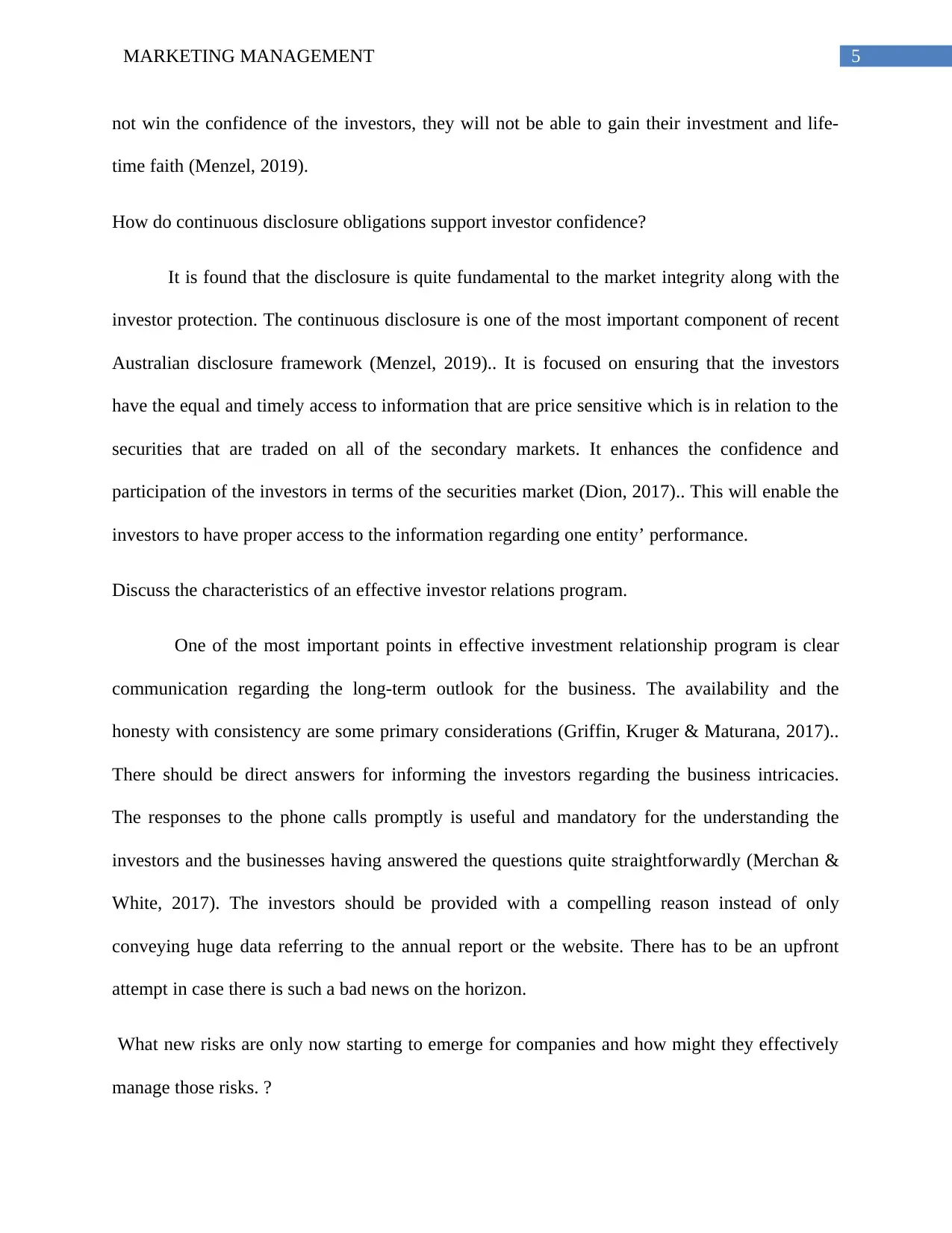
5MARKETING MANAGEMENT
not win the confidence of the investors, they will not be able to gain their investment and life-
time faith (Menzel, 2019).
How do continuous disclosure obligations support investor confidence?
It is found that the disclosure is quite fundamental to the market integrity along with the
investor protection. The continuous disclosure is one of the most important component of recent
Australian disclosure framework (Menzel, 2019).. It is focused on ensuring that the investors
have the equal and timely access to information that are price sensitive which is in relation to the
securities that are traded on all of the secondary markets. It enhances the confidence and
participation of the investors in terms of the securities market (Dion, 2017).. This will enable the
investors to have proper access to the information regarding one entity’ performance.
Discuss the characteristics of an effective investor relations program.
One of the most important points in effective investment relationship program is clear
communication regarding the long-term outlook for the business. The availability and the
honesty with consistency are some primary considerations (Griffin, Kruger & Maturana, 2017)..
There should be direct answers for informing the investors regarding the business intricacies.
The responses to the phone calls promptly is useful and mandatory for the understanding the
investors and the businesses having answered the questions quite straightforwardly (Merchan &
White, 2017). The investors should be provided with a compelling reason instead of only
conveying huge data referring to the annual report or the website. There has to be an upfront
attempt in case there is such a bad news on the horizon.
What new risks are only now starting to emerge for companies and how might they effectively
manage those risks. ?
not win the confidence of the investors, they will not be able to gain their investment and life-
time faith (Menzel, 2019).
How do continuous disclosure obligations support investor confidence?
It is found that the disclosure is quite fundamental to the market integrity along with the
investor protection. The continuous disclosure is one of the most important component of recent
Australian disclosure framework (Menzel, 2019).. It is focused on ensuring that the investors
have the equal and timely access to information that are price sensitive which is in relation to the
securities that are traded on all of the secondary markets. It enhances the confidence and
participation of the investors in terms of the securities market (Dion, 2017).. This will enable the
investors to have proper access to the information regarding one entity’ performance.
Discuss the characteristics of an effective investor relations program.
One of the most important points in effective investment relationship program is clear
communication regarding the long-term outlook for the business. The availability and the
honesty with consistency are some primary considerations (Griffin, Kruger & Maturana, 2017)..
There should be direct answers for informing the investors regarding the business intricacies.
The responses to the phone calls promptly is useful and mandatory for the understanding the
investors and the businesses having answered the questions quite straightforwardly (Merchan &
White, 2017). The investors should be provided with a compelling reason instead of only
conveying huge data referring to the annual report or the website. There has to be an upfront
attempt in case there is such a bad news on the horizon.
What new risks are only now starting to emerge for companies and how might they effectively
manage those risks. ?
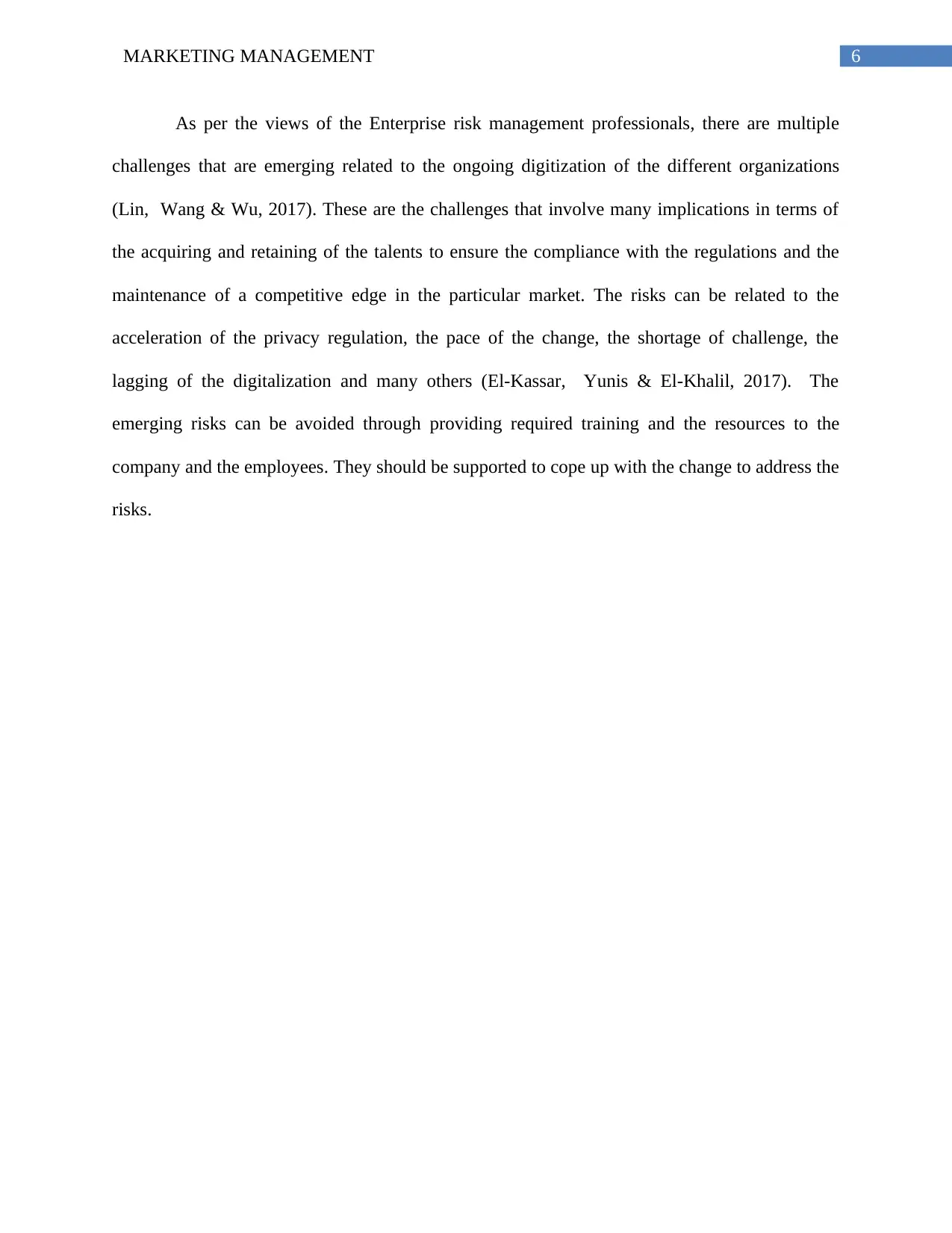
6MARKETING MANAGEMENT
As per the views of the Enterprise risk management professionals, there are multiple
challenges that are emerging related to the ongoing digitization of the different organizations
(Lin, Wang & Wu, 2017). These are the challenges that involve many implications in terms of
the acquiring and retaining of the talents to ensure the compliance with the regulations and the
maintenance of a competitive edge in the particular market. The risks can be related to the
acceleration of the privacy regulation, the pace of the change, the shortage of challenge, the
lagging of the digitalization and many others (El-Kassar, Yunis & El-Khalil, 2017). The
emerging risks can be avoided through providing required training and the resources to the
company and the employees. They should be supported to cope up with the change to address the
risks.
As per the views of the Enterprise risk management professionals, there are multiple
challenges that are emerging related to the ongoing digitization of the different organizations
(Lin, Wang & Wu, 2017). These are the challenges that involve many implications in terms of
the acquiring and retaining of the talents to ensure the compliance with the regulations and the
maintenance of a competitive edge in the particular market. The risks can be related to the
acceleration of the privacy regulation, the pace of the change, the shortage of challenge, the
lagging of the digitalization and many others (El-Kassar, Yunis & El-Khalil, 2017). The
emerging risks can be avoided through providing required training and the resources to the
company and the employees. They should be supported to cope up with the change to address the
risks.
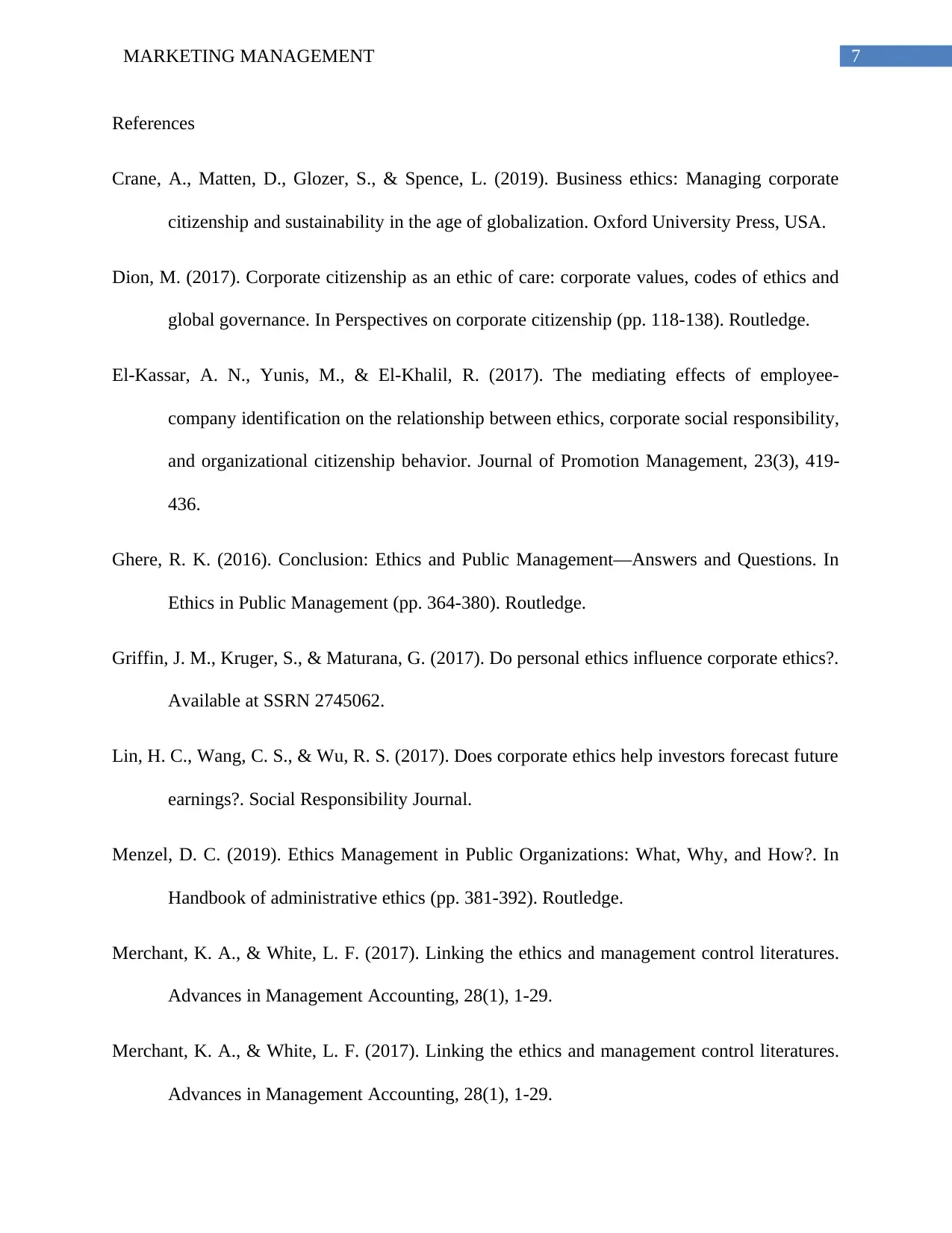
7MARKETING MANAGEMENT
References
Crane, A., Matten, D., Glozer, S., & Spence, L. (2019). Business ethics: Managing corporate
citizenship and sustainability in the age of globalization. Oxford University Press, USA.
Dion, M. (2017). Corporate citizenship as an ethic of care: corporate values, codes of ethics and
global governance. In Perspectives on corporate citizenship (pp. 118-138). Routledge.
El-Kassar, A. N., Yunis, M., & El-Khalil, R. (2017). The mediating effects of employee-
company identification on the relationship between ethics, corporate social responsibility,
and organizational citizenship behavior. Journal of Promotion Management, 23(3), 419-
436.
Ghere, R. K. (2016). Conclusion: Ethics and Public Management—Answers and Questions. In
Ethics in Public Management (pp. 364-380). Routledge.
Griffin, J. M., Kruger, S., & Maturana, G. (2017). Do personal ethics influence corporate ethics?.
Available at SSRN 2745062.
Lin, H. C., Wang, C. S., & Wu, R. S. (2017). Does corporate ethics help investors forecast future
earnings?. Social Responsibility Journal.
Menzel, D. C. (2019). Ethics Management in Public Organizations: What, Why, and How?. In
Handbook of administrative ethics (pp. 381-392). Routledge.
Merchant, K. A., & White, L. F. (2017). Linking the ethics and management control literatures.
Advances in Management Accounting, 28(1), 1-29.
Merchant, K. A., & White, L. F. (2017). Linking the ethics and management control literatures.
Advances in Management Accounting, 28(1), 1-29.
References
Crane, A., Matten, D., Glozer, S., & Spence, L. (2019). Business ethics: Managing corporate
citizenship and sustainability in the age of globalization. Oxford University Press, USA.
Dion, M. (2017). Corporate citizenship as an ethic of care: corporate values, codes of ethics and
global governance. In Perspectives on corporate citizenship (pp. 118-138). Routledge.
El-Kassar, A. N., Yunis, M., & El-Khalil, R. (2017). The mediating effects of employee-
company identification on the relationship between ethics, corporate social responsibility,
and organizational citizenship behavior. Journal of Promotion Management, 23(3), 419-
436.
Ghere, R. K. (2016). Conclusion: Ethics and Public Management—Answers and Questions. In
Ethics in Public Management (pp. 364-380). Routledge.
Griffin, J. M., Kruger, S., & Maturana, G. (2017). Do personal ethics influence corporate ethics?.
Available at SSRN 2745062.
Lin, H. C., Wang, C. S., & Wu, R. S. (2017). Does corporate ethics help investors forecast future
earnings?. Social Responsibility Journal.
Menzel, D. C. (2019). Ethics Management in Public Organizations: What, Why, and How?. In
Handbook of administrative ethics (pp. 381-392). Routledge.
Merchant, K. A., & White, L. F. (2017). Linking the ethics and management control literatures.
Advances in Management Accounting, 28(1), 1-29.
Merchant, K. A., & White, L. F. (2017). Linking the ethics and management control literatures.
Advances in Management Accounting, 28(1), 1-29.
Paraphrase This Document
Need a fresh take? Get an instant paraphrase of this document with our AI Paraphraser
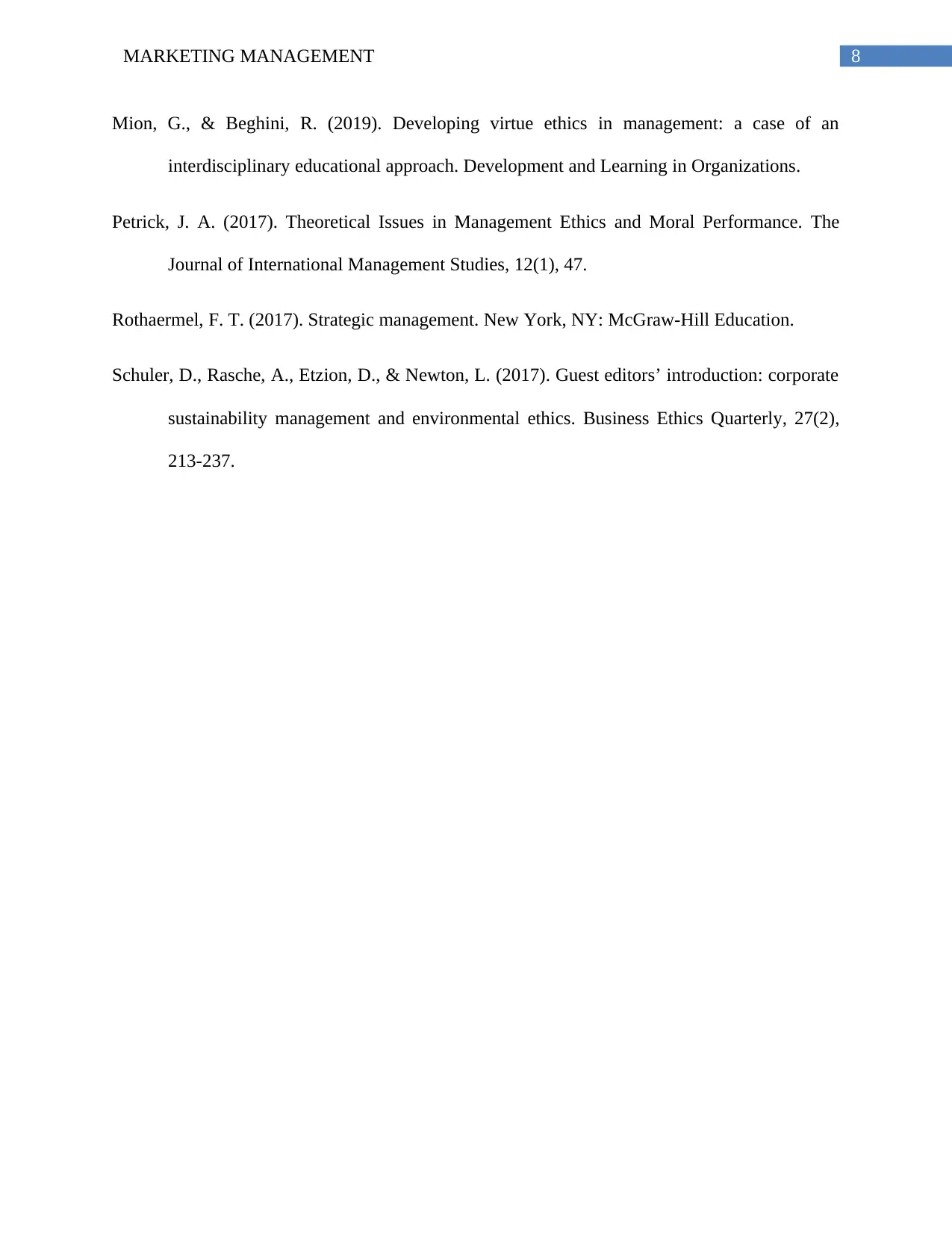
8MARKETING MANAGEMENT
Mion, G., & Beghini, R. (2019). Developing virtue ethics in management: a case of an
interdisciplinary educational approach. Development and Learning in Organizations.
Petrick, J. A. (2017). Theoretical Issues in Management Ethics and Moral Performance. The
Journal of International Management Studies, 12(1), 47.
Rothaermel, F. T. (2017). Strategic management. New York, NY: McGraw-Hill Education.
Schuler, D., Rasche, A., Etzion, D., & Newton, L. (2017). Guest editors’ introduction: corporate
sustainability management and environmental ethics. Business Ethics Quarterly, 27(2),
213-237.
Mion, G., & Beghini, R. (2019). Developing virtue ethics in management: a case of an
interdisciplinary educational approach. Development and Learning in Organizations.
Petrick, J. A. (2017). Theoretical Issues in Management Ethics and Moral Performance. The
Journal of International Management Studies, 12(1), 47.
Rothaermel, F. T. (2017). Strategic management. New York, NY: McGraw-Hill Education.
Schuler, D., Rasche, A., Etzion, D., & Newton, L. (2017). Guest editors’ introduction: corporate
sustainability management and environmental ethics. Business Ethics Quarterly, 27(2),
213-237.
1 out of 8
Your All-in-One AI-Powered Toolkit for Academic Success.
+13062052269
info@desklib.com
Available 24*7 on WhatsApp / Email
![[object Object]](/_next/static/media/star-bottom.7253800d.svg)
Unlock your academic potential
© 2024 | Zucol Services PVT LTD | All rights reserved.



